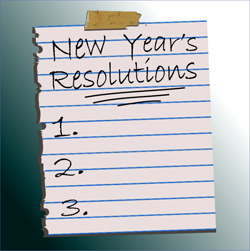Making (And Keeping) New Year's Resolutions
Quit smoking? Lose weight? Save money? Choose resolutions that stick

Dan Ariely's approach to New Year's resolutions is simply not to make them.
"If you don't have resolutions, you can't break them," said Ariely, author of "Predictably Irrational" and James B. Duke Professor of Psychology and Behavioral Economics at Duke's Fuqua School of Business.
However, if you insist on resolutions to ring in 2012, Ariely suggests taking time to think about how to keep resolutions top of mind throughout the year.
Ariely and other Duke experts share the following five tips for creating resolutions with staying power.
Be specific. Very specific. Ariely said that the more clear cut your resolutions are, the easier they are to handle. Very specific restrictions make it easy to know if you are following the resolution. "If you want to cut down on desserts, don't say you'll simply eat fewer desserts," he said. "Say you won't eat desserts on weekdays. Period. Then you don't have to guess at what `less' means."
Get inspired. Meaningful resolutions have sticking power, said Beth Reardon, director of integrative nutrition at Duke Integrative Medicine. "If you want your resolution to act like Velcro rather than Teflon, be sure to link it to deep, authentic intentions," she said. "For example, resolving to order more food from Community Supported Agriculture is more powerful if you link it to your desire to support local businesses as well as your own health."
Are you ready? Resolutions are most effective if they are based on a genuine readiness to change a behavior and develop a plan, said Andy Silberman, director of Duke's Personal Assistance Program. He counsels not resolving to change until you can explain how concerned you are about the behavior. It is also useful to outline what your motivation is to change, what specifically you want to accomplish and how confident you are that you can make the change. Knowing these answers will make you more committed, and more likely to be successful. "New Year's is a very arbitrary time to change your behavior.," he said. "Why not today?"
Set yourself up for success. The most powerful tool for making a resolution stick is to pre-commit yourself by changing circumstances, said Scott Huettel, a professor of psychology and neuroscience at Duke who studies decision-making. Examples of pre-commitment are cutting up credit cards to reduce spending or setting up automatic deductions from a paycheck to increase saving.
"A resolution is a plan that you are going to make good decisions later," Huettel said. "By setting up circumstances so that the good decision is the default, it takes more work to slip back into old habits. "
Set consequences for broken promises. A powerful motivator for keeping resolutions top of mind after the holiday hubbub is to create costs for violating them. For example, public resolutions impose a social cost of embarrassment if you fail to keep a promise. Ariely recommended setting up actual costs to increase motivation. "If you promise to pay your friend $100 every time you violate the contract, suddenly the experience is much more interesting," he said.